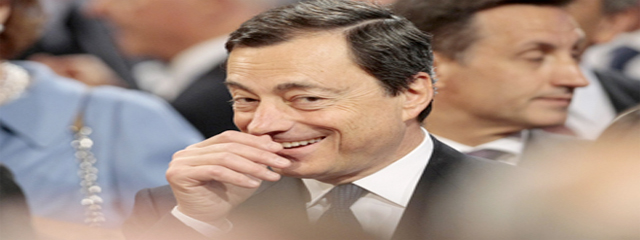He startled analysts by immediately launching a robust LTRO long term financial facility, designed for shoring up banking liquidity but covertly aimed at providing a helping hand to hard-pressed sovereigns. He even dared to buy in secondary markets a sizeable amount of Italian bonds to prevent their risk premium from soaring beyond control.
Crossing the red line of monetising struggling countries’ deficits triggered the resignation of Axel Weber, the Bundesbank Chairman. The ECB chief economist, Jürgen Stark, also threw in the towel. Both failed to win support back in Berlin for fending off such heresies as the German government grew increasingly alarmed at the prospect of a full-fledged Euro implosion.
The bold gamble paid off. Super-Mario could even boast last summer of saving the day when the battle seemed lost. While the new Bundesbank boss has openly criticised his policy stance, Draghi has managed to get valuable support from Jörg Asmussen, a former Ms Merkel’s aide, thus bridging most discrepancies with Berlin. Both voted against the recent rate cut and the unlimited liquidity window opened till July 2015, alongside their Dutch and Austrian colleagues in the ECB governing board. But the deflationary danger seems all too evident to dismiss the move as an open invitation to profligacy.
For all the outrage sparked by this unexpected move in the German media, Berlin seems somehow relieved at the thought the easy going monetary stance has once and forever bottomed, losing any further potential steam.
That may be true in terms of conventional measures as reaching a discount rate as low as .25% leaves little room for any additional rebate. But getting to grips with a prolonged scenario of sluggish growth may require new bold moves such as LTRO or an asset buying programme.
Not to mention the prospect of lowering the standards for collaterals or providing direct financing to firms for cutting short the credit crunch currently hitting many economies. Draghi may be forced to anger Germany should the situation fail to improve.
All efforts should be deployed in averting an open clash with the most powerful member of the Euro club, but never at the price of sacrificing growth on the altar of stability. As the worst seems over, allaying fears the Euro zone might face a disorderly crash landing, the current broad consensus may fade away should enshrining economic equilibrium at any cost induce a heavy toll on less performing countries. Sooner or later they will refuse to become the collateral casualties of a doctrinaire policy.






Be the first to comment on "Draghi is bound to anger the Germans"